*
Masterworks Broadway is celebrating its first anniversary with a grand sweepstakes — which can be accessed at their .com — plus five digital releases. Four of the five cast albums have previously been available under license to other labels, so some readers no doubt already have a few (or all) of them. Others might still listen to the original LPs, even. But these scores are surely unknown to the multitude of listeners, and I expect that at least some newcomers will get plenty of enjoyment from these specimens of failed musicals, circa 1959.
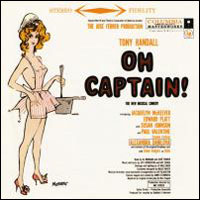 |
Oh, Captain! was an amateur affair, headed by a first-time (and only-time) producer. He hired the successful Hollywood songwriting team of Jay Livingston and Ray Evans, three-time Oscar winners — but they were new to Broadway. The director-librettist was one of Broadway's great men at the time: Jose Ferrer, with two Tonys (and an Oscar). But no musical theatre experience. Randall, who was coming off a strong performance in the drama Inherit the Wind, had never done a musical; neither of his two co-starred leading ladies had ever been on Broadway, either. All of this does not foredoom your Broadway musical; but it's no recipe for success. The critical reception was slightly better than mixed, which without stars wasn't enough to distract ticketbuyers from the newly-opened Music Man, West Side Story, and Lena Horne's Jamaica.
The score is not distinctive, certainly; the cast album, though, is joyfully tuneful. Best of the songs, perhaps, is an irrepressible duet called "You're So Right for Me"; I guess you could say it has little to do with the plot, unsurprising as it was written and used in Livingston & Evans' 1954 TV musical "Satins and Spurs." (This Betty Hutton vehicle was apparently TV's first color special, and lousy; but the song under discussion sure swings.) "A Very Proper Town" is a sturdy opening number in Gilbert & Sullivan style; "Surprise" is a likable number for the likable wife, played by Jacquelyn McKeever; "Femininity" is one of those femme fatale songs that the boys often wrote for their films, here sung by Eileen Rodgers (stepping in for the recording in place of Ms. Lane, who was under contract to a different label); and there are two fine duets for the ladies, the tender "You Don't Know Him" and the raucous "Double Standard." Also on hand is Susan Johnson, who is never less than compelling but is here given an extraneous role with two songs I don't much like. But oh, how she delivers them. Part of the exuberance of the recording comes from the orchestrations. This was an unusual show in that department, with the official credits listing eight different orchestrators. First in non-alphabetical order — and thus, probably, one of the larger contributors — is the great Robert Ginzler, still a year away from his breakthrough to prominence with Gypsy. My guess is that he did the delectable charts for "Surprise," the Parisian version of "Life Does a Man a Favor" (both of which feature Ginzleresque flute writing), and "Femininity." I would also think that the G&S-like "Very Proper Town" is from Phil Lang, in his My Fair Lady mode; and that the wildest number — "You're So Right for Me," in both song and overture version — is from Sy Oliver.
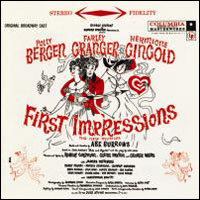 |
First Impressions was pretty much unsuitable, Jane Austen-wise. The score was by young songwriters Robert Goldman and Glen Paxton, paired with Brill Building-regular George Weiss. (Styne had similarly used the latter on his 1956 production Mr. Wonderful to supplement songs by novice songwriters Jerry Bock and Larry Holofcener.) As the heroine Elizabeth and her Darcy, they had Polly Bergen and Farley Granger. More suitable than Gingold, but that's not saying much. Still, the cast album is an enjoyable one which I occasionally listen to; more often than successful 1950s musicals like Can-Can and New Girl in Town. The orchestrations, by Don Walker and Mr. Ginzler, are sprightly; and there's a lovely duet called "I Feel Sorry for the Girl" sung by the unlikely couple of Donald Madden (as Bingley) and Phyllis Newman (as Jane Bennet).
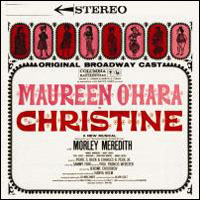 |
The songs came from another pair of Hollywoodites with two Best Song Oscars: Sammy Fain, who kept returning to Broadway over the years with less-than-profitable results, and lyricist Paul Francis Webster. And while the Broadway musical has seen plenty of librettos by Pulitzer Prize-winners, Christine is the only specimen with a book written — on purpose, in person — by someone with both a Pulitzer and Nobel Prize. Give up? Pearl S. Buck, who first invaded Broadway in March 1959 with a play that lasted seven performances; returned in April 1960 with Christine, for 12 performances; and then went back to her books.
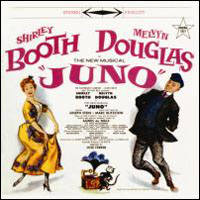 |
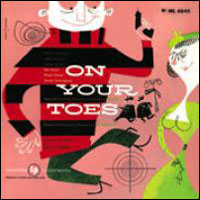 |
Jack Cassidy sings Junior, which is all to the good (although I don't expect you'd want to see him playing the role onstage). Portia Nelson sings Frankie, which doesn't work out as well; she doesn't seem the ingenue type. Nobody sings the female lead, of course, as it is a ballet role; the other soloists are unfamiliar to me. The strange thing about this recording is the pace; the tempi are slow, but I mean slow. It may be that the 1983 version has spoiled me; returning to 1952 after many years, the songs feel lethargic (especially "It's Got to Be Love," "Quiet Night" and "Glad To Be Unhappy"). But maybe this pace is authentic?
Toes was not some ancient musical, being a mere 16 years old at the time. Besides, Engel typically did his homework, and Rodgers might well have been consulted. And Vera Zorina — Mrs. Lieberson — could surely have authenticated matters, if she cared to stop by rehearsals; she never sang the score, but starred in the London and Hollywood versions. In any case, "Slaughter on Tenth Avenue" — with some slight alterations from the now accustomed version — sounds fine on this recording.
***
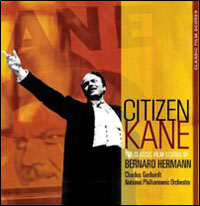 |
The last is an exception among its companions, all of which were conducted by Charles Gerhardt. Raksin conducts his CD himself. Raksin, who is best known for "Laura" and the pop standard fashioned from the theme, was quite a character. He started out on Broadway, ghosting orchestrations for Hans Spialek at Chappell — including the above-mentioned "It's Got to Be Love" from On Your Toes. From whence comes one of our favorite orchestrator stories. Richard Rodgers, at the orchestra reading, vehemently objected to one of the harmonies he heard in Raksin's chart. "What have you done to my music!" he yelled at Raksin, in front of the assembled musicians. Raksin shrugged, "What music!" And that was the end of Raksin's employment at Chappell.
(Steven Suskin is author of the recently released updated and expanded Fourth Edition of "Show Tunes" as well as "The Sound of Broadway Music: A Book of Orchestrators and Orchestrations," "Second Act Trouble" and the "Opening Night on Broadway" books. He also pens Playbill.com's Book Shelf and DVD Shelf columns. He can be reached at [email protected].)
*
Visit PlaybillStore.com to view theatre-related recordings for sale.










